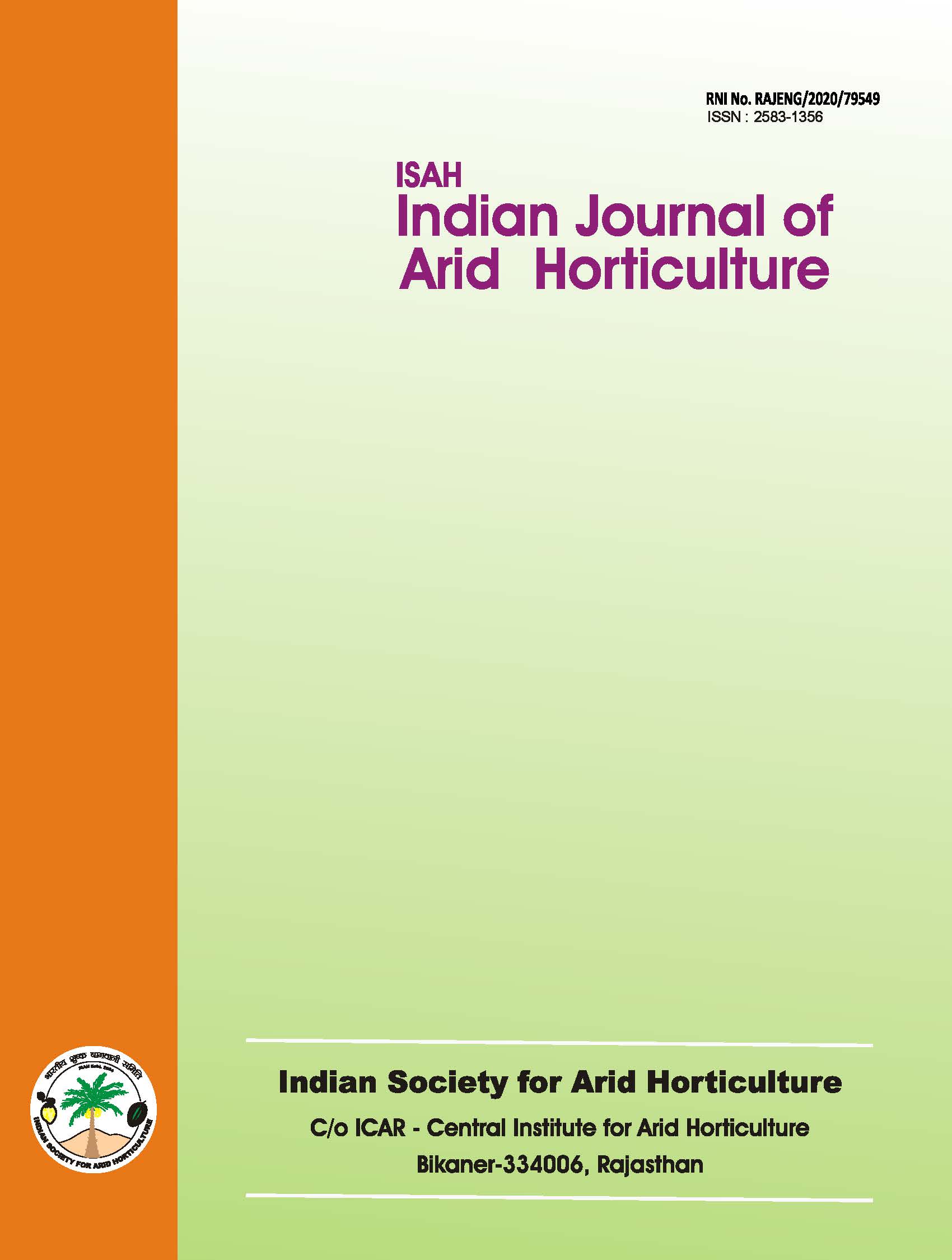Standardization of pit size and organic filling mixture for raising tissue cultured date palm in hot arid region of western Rajasthan
DOI:
https://doi.org/10.48165/ijah.2021.3.1.4Keywords:
Date Palm, FYM, Pits, filling mixtureAbstract
The study aims to provide comprehensive guidelines for optimizing pit size and the composition of filling mixtures, thereby fostering the growth, root development and overall health of tissue cultured Barhee date palm cultivars. The experiment was undertaken in 2019- 2021 at the ICAR-Central Institute for Arid Horticulture research farm located in Bikaner, Rajasthan, India. Fully hardened tissue-cultured saplings of the Barhee cultivar of date palm were planted with a spacing of 5 x 5 m in the month of July. Different planting pit sizes (1.0 m x 1.0 m x 1.0 m, 0.75 m x 0.75 m x 0.75 m, and 0.50 m x 0.50 m x 0.50 m) and filling mixtures of field soil, clay and FYM (1.0: 1.0:1.0, 2.0:0.5:0.5, 0.5:2.0:0.5 and 0.5:0.5:2.0) were used as treatment combinations for evaluating the growth of plants. The results indicated that tissue-cultured plants of the Barhee cultivar raised in a pit size of 1 m3 with a filling mixture of field soil, clay, and FYM in the ratio of 0.5:0.5:2.0 performed better.
Downloads
References
Abdel-Hameed, M.A. and Ragab, M.A. 2004. Response of Sewy date palm to application of some organic fertilizers. Abstract of the Second Inter. Conf. on Date Palm. Fac. Agric., El-Arish Suez Canal Univ., Egypt.
Acharya, C.L., Bishnoi, S.K. and Yaduvanshi, H.S. 1988. Effect of long-term application of fertilizers, organic and inorganic amendments under continuous cropping on soil physical
and chemical properties of Alfisol. Indian Journal of Agricultural Science, 58:509-516.
Allan, R. 1998. A report on pit size treatments and how these impact on tree growth and survival. In: ICFR Bulletin Series No. 04/98. Institute for Commercial Forestry Research, Pietermaritzburg. ICARDA Annual Report, 2015. Towards dynamic drylands.
Amanullah, M.M., Rashid, A., Aziz, A., Hussain, N. and Islam, Z. 2013. Effect of various levels of N in combination with FYM on the growth and establishment of date palm (Dhakki) cultivar. In Series B: Biological Sciences, p. 65.
Bhansali, R.R. 2009. Date palm cultivation in the changing scenario of Indian arid zones: challenges and prospects. Desert plants: biology and biotechnology, 31:423-59.
Bhriguavanshi, S.R.1988. Long-term effect of high doses of farm yard manure on soil properties and crop yield. Journal of the Indian Society of Soil Science, 36:787-790.
Black, C.A. 1965. Methods of Soil Analysis. Part 2, Chemical and Microbiological properties. Agron. Mono. No.9. (American Society of Agronomy, Madison, WI, USA).
Bouyoucos, G.J. 1962. Hydrometer method improved for making particle size analyses of soils. Agron. J.54:464-465. Diab, Y.M. 2006. Effect of some cultural practices on yield and fruit quality of Phoenix dactylifera L. cv. Sewy under New Valley conditions. M.Sc. Thesis, Fac. Agric. Assiut Univ., Egypt.
Ghafoor, A. and Gopang, A.D.1988. Date palm culture in Pakistan. Progressive Farming, 8(1):8-13.
Gomez, K.A. and Gomez, A.A.1984. Statistical procedures for agricultural research, 2nd Edn., John Wiley and Sons, Singapore, p.98.
Jackson, M.L.1973. Soil Chemical Analysis. Prentice Hall of India Pvt. Ltd., New Delhi.
Jackson, M.L.1979. Soil Chemical Analysis-Advanced Course. Second Edition, University of Wisconsin, Madison, USA.
Jo, H.K., Park, H.M. 2017. Effects of pit plantings on tree growth in semi-arid environments. For. Sci. Technol., 13(2):66–70.
Johnson, A.I., 1963. A field method for measurement of infiltration. Geological Survey, Federal Center, Denver Co, p, 27.
Johnson, D.V., Al-Khayri, J.M. and Jain S.M. 2013. Seedling date palms (Phoenix dactylifera L.) as genetic resources. Emirates Journal of Food and Agriculture, 25(11):809-830.
Kaurch, K., Kapoor, K. and Gupta A. 2005. Impact of organic manures with and without mineral fertilizers on soil chemical and biological properties under tropical conditions. J. Plant Nutr. Soil Sci., 168:117-122.
Lindsay, W.L. and Norvell, W.A. 1978. Development of DTPA soil test for zinc, iron, manganese and copper. Proceedings of Soil Science Society of America, 42:421 - 428.
Mansour, A.E.M., Ahmed, F.F. and Ahmed, F.F. 2004. Effect of bio- and organic sources of N as a partial substitute for mineral fertilizer on fruiting of Sewy date palms. The Second International Conference on Date Palm, Fac. Agric., ElArish, Suez Canal Univ.
Mauki, D. and Kilonzo, M. 2022. Planting pit size determines successful tree seedling establishment in arid and semi arid regions of Tanzania. Environmental and Sustainability Indicators, 15:100197.
Mohamed, G.A. and Gobara, A.A. 2004. Response of Sewy date palms grown under New Valley conditions to organic, bio and mineral fertilization. Minia J. of Agric. Res. & Develop., 24(3):397-414.
Ndegwa, G., Iiyama, M., Anhuf, D., Nehren, U. and Schlüter, S. 2017. Tree establishment and management on farms in the drylands: evaluation of different systems adopted by small scale farmers in Mutomo District, Kenya. Agrofor. Syst., 91(6):1043-1055.
Olsen, S.R., Cole, C.S., Wantable, F.S. and Dean, C.A. 1954. Estimation of available phosphorus in soils by extraction with sodium bicarbonate USDA, Washington, D.C. Circular. 18: 939.
Subbaiah, B.V. and Asija, G.L.1956. A rapid procedure for the estimation of available nitrogen in soil. Curr. Sci., 25:259-60. Tang, Y., Zhang, H., Schroder, J.L., Payton, M.E. and Zhou, D. 2007. Animal manure reduces aluminum toxicity in an acid soil. Soil Sci. Soc. Am. J., 71(6):1699-1707.
Withan, F.H., Blaydes, D.F. and Devlin, R.M. 1971. Experiments in Plant Physiology. pp 55–58. Van Nostrand Reinhold Co., New York.
Walkley, A., and Black, I.A. 1934. An examination of the Degtjareff method for determining soil organic matter, and a proposed modification of the chromic acid titration method. Soil Science, 37(1):29-38.
Yang, C., Yang, L., Yang, Y. and Ouyang, Z. 2004. Rice root growth and nutrient uptake as influenced by organic manure in continuously and alternately flooded paddy soils. Agricultural Water Management, 70(1):67-81.

